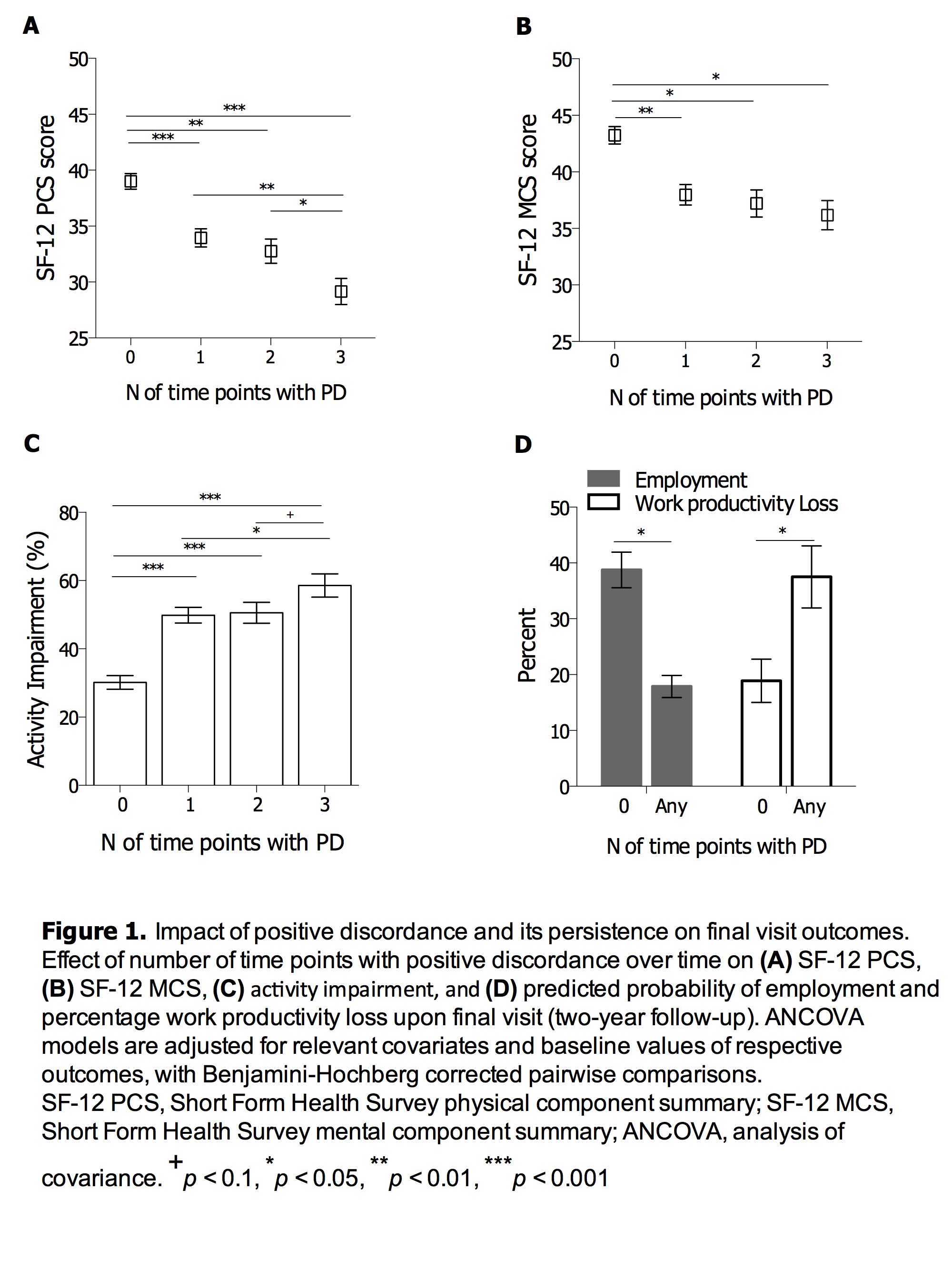Session Information
Session Type: ACR Concurrent Abstract Session
Session Time: 4:30PM-6:00PM
Background/Purpose: The impact of discordant patient-physician assessments of rheumatoid arthritis (RA) activity on quality of life is largely unknown. We examined the prevalence and stability of discordance on serial visits, over two years, in a large cohort of Hispanics from a single center in the US; we further explored the influence of discordance -at any point- and its persistence on health-related quality of life (HRQoL) and work productivity upon final visit.
Methods: We evaluated 308 patients with established RA. Patient (PGA) and physician/ evaluator (EGA) global assessments were measured annually on 10-cm visual analogue scales; discordance was defined as a difference ³ 3 cm between them. HRQoL was quantified using the SF-12 physical (PCS) and mental (MCS) component summary scores (higher scores indicate better HRQoL). Activity impairment, work productivity loss, presenteeism and absenteeism were calculated based on the Work Productivity and Activity Impairment Questionnaire. The impact of discordance and its persistence on HRQoL, activity impairment and employment-related outcomes at two years was assessed using analysis of covariance, adjusting for baseline values of those outcomes.
Results: Positive discordance (PD, or higher patient ratings) was more prevalent and stable over time (k range 0.32-0.36); 85 (27.6%) subjects had PD once, 49 (15.9%) twice, and 45 (14.6%) at all three time points. Negative discordance (ND, or lower patient ratings) was less common and unstable; 45 (14.6%) patients had ND once, 10 (3.3%) twice, and 1 (0.3%) at all three time points. Any PD throughout the study adversely impacted HRQoL upon last visit; persistence of PD yielded progressively lower SF-12 PCS (Fig 1A, p<0.001), and SF-12 MCS was lower among patients with any PD compared to those without (Fig 1B, p<0.001). Presence and persistence of PD yielded progressively greater activity impairment at final visit (Fig 1C, p<0.001). PD was negatively associated with employment (p<0.025); moreover, higher presenteeism (p=0.001) and work productivity loss (p=0.014) were seen with any PD (Fig 1D). PD appeared to be a patient-specific rather than a visit-specific feature; those with baseline PD had higher prevalence of fibromyalgia and irreversible articular damage (both p<0.01), and were 5-times more likely to have future PD.
Conclusion: Positive discordance is common and generally stable over time. Its presence Ð at any time- and persistence adversely and incrementally impact clinical outcomes, including health related quality of life, work productivity, and activity impairment upon final visit.
To cite this abstract in AMA style:
Karpouzas G, Ramadan S, Cost C, Draper T, Hernandez E, Ormseth S. Discordant Patient-Physician Assessments of Disease Activity and Its Persistence Adversely Impact Quality of Life and Work Productivity in United States Hispanics with Rheumatoid Arthritis [abstract]. Arthritis Rheumatol. 2017; 69 (suppl 10). https://acrabstracts.org/abstract/discordant-patient-physician-assessments-of-disease-activity-and-its-persistence-adversely-impact-quality-of-life-and-work-productivity-in-united-states-hispanics-with-rheumatoid-arthritis/. Accessed .« Back to 2017 ACR/ARHP Annual Meeting
ACR Meeting Abstracts - https://acrabstracts.org/abstract/discordant-patient-physician-assessments-of-disease-activity-and-its-persistence-adversely-impact-quality-of-life-and-work-productivity-in-united-states-hispanics-with-rheumatoid-arthritis/

